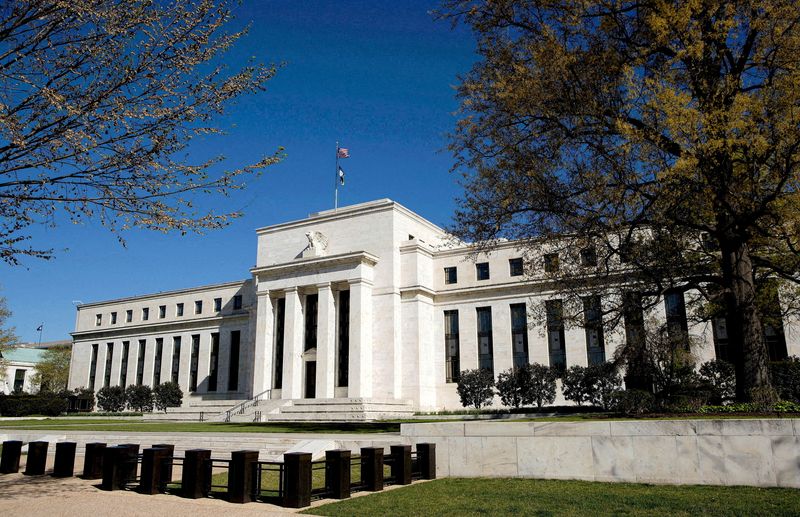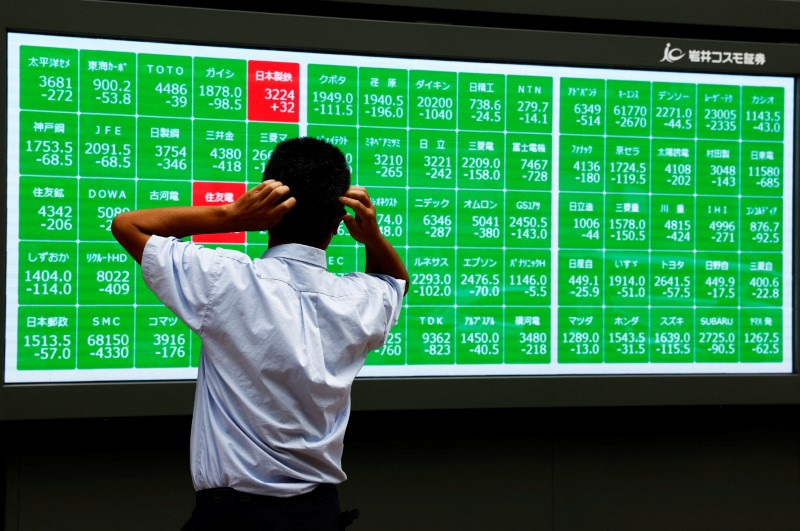By Koh Gui Qing and Elizabeth Howcroft
NEW YORK/PARIS (Reuters) - Global stocks held steady and government bond yields retreated a touch on Wednesday after data showed U.S. consumer prices rose moderately in July, as expected, reinforcing investor bets that the Federal Reserve could start cutting interest rates soon.
But the size of the Fed's first cut, which many investors are hoping will take place in September, remains in doubt as the market debates the chances of a 25- or 50-basis-point reduction.
The consumer price index rose 0.2% last month after falling 0.1% in June, data showed, although inflation in shelter, which includes rents, accelerated in July compared with June.
"The one thing that was surprising here was rent accelerating," said Gennadiy Goldberg, head of U.S. rates strategy at TD Securities in New York. "I think that's the reason for the market's somewhat disappointed reaction, even though the print actually came in on the weaker side of consensus.
"I do think the market is reassessing the odds of a 50-basis-point rate cut in September. That pricing seems to have dropped from about 39 base points ahead of the reading to 36 basis points now."
The S&P 500 finished up 0.38%, the Dow Jones Industrial Average added 0.6%, and the Nasdaq Composite ended unchanged. [.N] The MSCI World Equity index was up 0.51%, at its highest level in 12 days.
In line with expectations that U.S. monetary policy will soon be eased, the benchmark 10-year Treasury yield fell to 3.8371%, and the two-year Treasury yield was steady at 3.9621%.
Europe's STOXX 600 was up 0.5% on the day, while London's FTSE 100 was up 0.6% after data showed British inflation rose less than expected in July.
POLICY EASING
Central banks around the world successively have begun to cut interest rates in recent months as inflation cooled. New Zealand's central bank cut interest rates for the first time in four years on Wednesday, and signalled more monetary policy easing to come. The move sparked a sell-off in the Kiwi dollar, which was down around 1% on the day.
The Japanese yen and the Nikkei wobbled after Japan's prime minister, Fumio Kishida, said he would step down next month, but Asian shares rose overall as markets recovered from the recent rout.
UBS shares were up around 3.1% after the bank reported $1.1 billion of net profit in the April to June quarter, beating analysts' forecasts.
Last week's global market sell-off was widely attributed to fears of a U.S. recession, which left traders betting that the Federal Reserve would need to cut interest rates quickly to spur growth. Stocks and bond markets were also affected by traders quitting the yen carry trade, in response to the yen's getting stronger following a surprise Bank of Japan rate hike.
U.S. data since then has eased recession fears. Stocks jumped on Tuesday after U.S. producer price data pointed to inflation cooling.
"Markets are less in panic mode," said Justin Onuekwusi, chief investment officer at investment firm St. James's Place.
Still, he said, traders may be getting ahead of themselves in their rate cut expectations.
"The market is being far too aggressive in those Fed cuts, particularly when you have hawkish-leaning Fed officials saying they are looking for more data to support cuts."
Atlanta Federal Reserve President Raphael Bostic said on Tuesday he wanted to see "a little more data" before he's ready to support lowering interest rates.
Pressured by bets of imminent U.S. rate cuts, the dollar index was on the backfoot at 102.61. A sluggish dollar helped the euro climb to the day's high of $1.10475, its highest level in more than eight months.

In commodities, Brent crude futures were down 1% at $79.9 a barrel, while U.S. West Texas Intermediate crude fell 1.5% to $77.18. Traders said concerns that conflict may spread in the Middle East and threaten production in one of the world's major oil producers had eased slightly. [O/R]
Buffeted by speculation about the size of the Fed's first rate cut, gold traded 0.7% lower at $2,447.2 an ounce. [GOL/]
